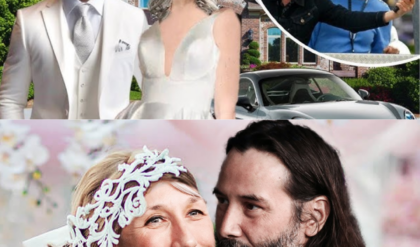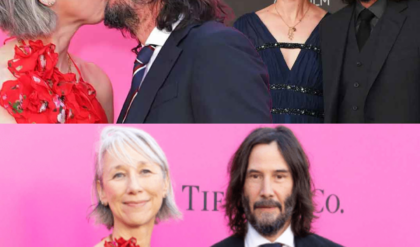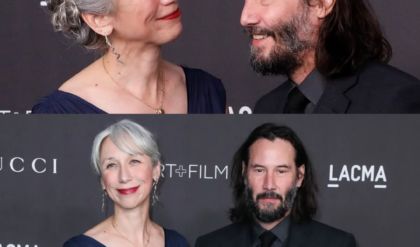
An Orc in The Lord of the Rings: The Rings of Power (2024), Amazon MGM Studios
The Lord of the Rings: The Rings of Power showrunners J.D. Payne and Patrick McKay addressed why they attempted to humanize the orcs in the second season of the show with a baby.

SAN DIEGO, CALIFORNIA – JULY 25: (L-R) Showrunners J.D. Payne and Patrick McKay attend The Lord Of The Rings: The Rings Of Power SDCC Press Preview Event at Venue 808 on July 25, 2024 in San Diego, California. (Photo by Jerod Harris/Getty Images for Amazon MGM Studios)
In the second season’s third episode, one orc is depicted questioning going to war and is then shown embracing a female orc with a young baby with the obvious implication that the orc questioning going to war is the father and husband of the female orc and child.
Orcs just want a safe place to raise their kids, be evil, and practice their corrupted form of life in peace.#TheRingsOfPower pic.twitter.com/KTYGCZA2if
— Nerdrotic (@Nerdrotics) August 29, 2024
Speaking with Deadline about this scene, J.D. Payne declared, “From the beginning of this season, we talked about the idea of having with an arc, and we feel like this goes straight back to Tolkien. You read the books and you get these blips of moments where orcs are kind of on their own and they’re saying, ‘Hey, what if one day there could be a place just for us, we could have our own little land or our own little cottage by the sea, so to speak, where they have dreams, they have aspirations, they don’t just want to be mindless killing machines.’”
“We tried to take that a step further and continue to individuate them and dramatize what their desires and ambitions might be. And we were also always fascinated by the idea that the orcs are fallen elves,” he added.

Sam Hazeldine as Adar in The Lord of the Rings: The Rings of Power (2024), Amazon MGM Studios
From there, Payne said, “Tolkien has this idea that evil can’t create anything, it can only corrupt. That the elves, these amazing, beautiful creatures could be corrupted into the orcs was fascinating to us. And so the idea of Adar as the missing link between the two to get his story as who he was as an elf and how and why he was turned, and then to see where that could lead him in terms of being the father of an entire race, that felt really compelling to us.”
“We get some of those answers filled in for us this season and then get to see how again, those benevolent desires can ultimately lead to tragic ends,” he concluded.

Charlie Vickers as Sauron in The Lord of the Rings: The Rings of Power (2024), Amazon MGM Studios
His co-showrunner Patrick McKay also shared, “I would just add that even when we were writing movies, I think JD and I, we spend an enormous amount of time and put an enormous amount of thought into our villains.”
“Just going back to Hitchcock, this line that I love that he said in some interview where he talked about the movies he was most proud of. It was always because he had the most compelling villains and he pointed to Claude Rains in Notorious, as this Nazi hiding in South America. He’s absolutely evil, but you understand what’s motivating him, which makes him not less scary, but more scary sometimes,” he elaborated.
“Villains are motivated by things that in their own heads make them think they’re the hero of their own story,” McKay concluded. “And that can make for really compelling drama. And so orcs who have dimension, who have things they care about, benefits all the stories in our mind.”

Sam Hazeldine as Adar in The Lord of the Rings: The Rings of Power (2024), Amazon MGM Studios
The Lord of the Rings author J.R.R. Tolkien had a number of interesting thoughts on orcs and none of them really corroborate Payne’s claim about Orcs having dreams or aspirations and that the depiction “goes straight back to Tolkien.”
In The Return of the King, Frodo informs Samwise Gamgee, “No, they eat and drink, Sam. The Shadow that bred them can only mock, it cannot make: not real new things of its own. I don’t think it gave life to the orcs, it only ruined them and twisted them; and if they are to live at all, they have to live like other living creatures. Foul waters and foul meats they’ll take, if they can get not better, but not poison.”
In The Two Towers, Treebeard speculates about the creation of the Uruk-hai by Saruman, “He has taken up with foul folk, with the Orcs. Brm, hoom! Worse than that: he has been doing something to them; something dangerous. For these Isengarders are more like wicked Men. It is a mark of evil things that came in the Great Darkness that they cannot abide the Sun; but Saruman’s Orcs can endure it, even if they hate it. I wonder what he has done? Are they Men he has ruined, or has he blended the races of Orcs and Men? That would be a black evil!”

An orc in The Lord of the Rings: The Rings of Power (2024), Amazon MGM Studios
In The Silmarillion, which was published by Christopher Tolkien following his father’s death, Orcs were slaves to Melkor and Tolkien made clear the entire race had “dark hearts.”
Tolkien wrote, “All those of the Quendi who came into the hands of Melkor, ere Utumno was broken, were put there in prison, and by slow arts of cruelty were corrupted and enslaved; and thus did Melkor breed the hideous race of the Orcs in envy and mockery of the Elves, of whom they were afterwards the bitterest of foes. For the Orcs had life and multiplied after the manner of the Children of Ilúvatar, and naught that had life of its own, nor the semblance of life, could ever Melkor make since his rebellion in the Ainulindalë before the Beginning: so say the wise. And deep in their dark hearts the Orcs loathed the Master who they served in fear, the maker only of their misery. This it may be was the vilest deed of Melkor and the most hateful to Ilúvatar.”

Sam Hazeldine as “Adar” (left) in The Lord of the Rings: The Rings of Power (2024), Amazon MGM Studios
In Letter 144 to Naomi Mitchison, Tolkien reiterated his work in The Silmarillion, “Orcs (the word is as far as I am concerned actually derived from Old English orc ‘demon’, but only because of its phonetic suitability) are nowhere clearly stated to be of any particular origin. But since they are servants of the Dark Power, and later of Sauron, neither of whom could, or would produce living things, they must be ‘corruptions.’”
He continued, “They are not based on direct experience of mine; but owe, I suppose, a good deal to the goblin tradition (goblin is used as a translation in The Hobbit, where orc only occurs once, I think), especially as it appears in George MacDonald, except for the soft feet which I never believed in. The name has the form orch (pl. yrch) in Sindarin and uruk in the Black Speech.”

Sam Hazeldine as “Adar” in The Lord of the Rings: The Rings of Power (2024), Amazon MGM Studios
In Letter 153 a draft to Peter Hastings, Tolkien discussed in detail the Orcs as well as other potential creations of Morgoth, “If they ‘fell’, as the Diabolus Morgoth did, and started making things ‘for himself, to be their Lord’, these would then ‘be’, even if Morgoth broke thesupreme ban against making other ‘rational’ creatures like Elves or Men. They would at least ‘be’ real physical realities in the physical world, however evil they might prove, even ‘mocking’ the Children of God.”
He continued, “They would be Morgoth’s greatest Sins, abuses of his highest privilege, and would be creatures begotten of Sin, and naturally bad. (I nearly wrote ‘irredeemably bad’; but that would be going too far. Because by accepting or tolerating their making – necessary to their actual existence – even Orcs would become part of the World, which is God’s and ultimately good.)”

Sam Hazeldine as Adar in The Lord of the Rings: The Rings of Power (2024), Amazon MGM Studios
Next, Tolkien shared, “But whether they could have ‘souls’ or ‘spirits’ seems a different question; and since in my myth at any rate I do not conceive of the making of souls or spirits, things of an equal order if not an equal power to the Valar, as a possible ‘delegation’, I have represented at least the Orcs as pre-existing real beings on whom the Dark Lord has exerted the fullness of his power in remodelling and corrupting them, not making them.”
“That God would ‘tolerate’ that, seems no worse theology than the toleration of the calculated dehumanizing of Men by tyrants that goes on today. There might be other ‘makings’ all the same which were more like puppets filled (only at a distance) with their maker’s mind and will, or ant-like operating under direction of a queen-centre.”

Charlie Vickers as Annatar in The Lord of the Rings: The Rings of Power (2024), Prime Video
In fact, Tolkien even discussed why things are corrupted in a draft to Rhona Beare labeled Letter 212. He explained, “I suppose a difference between this Myth and what may be perhaps called Christian mythology
is this. In the latter the Fall of Man is subsequent to and a consequence (though not a necessary consequence) of the ‘Fall of the Angels’ : a rebellion of created free-will at a higher level than Man; but it is not clearly held (and in many versions is not held at all) that this affected the ‘World’ in its nature: evil was brought in from outside, by Satan.”
“In this Myth the rebellion of created free-will precedes creation of the World (Eä); and Eä has in it, subcreatively introduced, evil, rebellions, discordant elements of its own nature already when the Let it Be was spoken. The Fall or corruption, therefore, of all things in it and all inhabitants of it, was a possibility if not inevitable. Trees may ‘go bad’ as in the Old Forest; Elves may turn into Orcs, and if this required the special perversive malice of Morgoth, still Elves themselves could do evil deeds. Even the ‘good’ Valar as inhabiting the World could at least err; as the Great Valar did in their dealings with the Elves; or as the lesser of their kind (as the Istari or wizards) could in various ways become self-seeking.”

Ciarán Hinds as Dark Wizard in The Lord of the Rings: The Rings of Power (2024), Amazon MGM Studios
In Letter 269, Tolkien responded to W.H. Auden who asked him about whether his portrayal of Orcs as an entire irredeemably wicked race was heretical.
He wrote, “With regard to The Lord of the Rings, I cannot claim to be a sufficient theologian to say whether my notion of orcs is heretical or not. I don’t feel under any obligation to make my story fit with formalized Christian theology, though I actually intended it to be consonant with Christian
thought and belief, which is asserted somewhere, Book Five, page 190,1 where Frodo asserts that the orcs are not evil in origin.”
Tolkien concluded, “We believe that, I suppose, of all human kinds and sons and breeds, though some appear, both as individuals and groups to be, by us at any rate, unredeemable…..”

Sam Hazeldine as Adar in The Lord of the Rings: The Rings of Power (2024), Amazon MGM Studios
It seems rather clear that this whole idea that the showrunners have of the Orcs having dreams and aspirations is not Tolkien at all, but rather is their own delusion of what Tolkien thought and wrote.
Tolkien was rather clear and reiterated his ideas regarding Orcs being unredeemable on a number of occasions to a number of different individuals.

Charlie Vickers as Annatar in The Lord of the Rings: The Rings of Power (2024), Amazon MGM Studios
What do you make of Payne and McKay’s explanation and reasoning behind how they depicted the Orcs?



